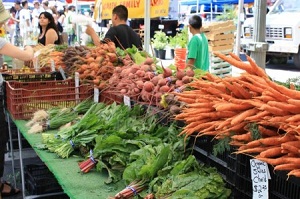
Rising global demand along with increasing domestic industrial output and a growing appetite for new export markets have created a favourable situation for the UAE foods sector, according to trends being evaluated by Dubai Exports , the export promotion agency of the Department of Economic Development in Dubai.
The food sector in Dubai already accounts for 10% of the emirate’s industrial production and based on the sector’s performance during the first nine months of 2014, food exports from Dubai for the whole year (2014) is estimated to reach AED 9.7 billion, an increase of four per cent over the AED 9.3 billion achieved in 2013. Food re-exports from Dubai is also expected to increase 10% in 2014 from AED 10.6 billion in 2013.
The buoyant mood in the local foods sector was visible at a gathering of food and beverage traders convened by Dubai Exports recently. Representatives of 40 companies attended the meeting and their feedback revealed aggressive export strategies and demand for specialised market intelligence, especially with regard to the GCC, Africa, Asia and CIS (Commonwealth of Independent States).
New exporters constituted 42% of the attendees while the rest had been exporting for over three years. Among the participants 61% said their exports crossed AED 20 million in 2014 and 94% said they expected over 10% exports increase in 2015. Thirty-seven per cent of the participants were more bullish with their sales growth estimates at more than 20% over 2014.
Saed Al Awadi, Chief Executive Officer of Dubai Exports, said, “A number of factors have evolved in recent years, enabling UAE-based food exporters to make inroads into new markets. China remains a top destination while population growth, rising middle class and high disposable incomes are creating new demand in GCC, Russia, CIS and African countries.” “With a solid industrial base of over 600 manufacturing firms, mostly small and medium enterprises, and a diverse product range, Dubai’s food trade is making a strong pitch to be a major supplier to these markets, with a high degree of success,” Al Awadi said adding that the number of food products exported in the first nine months of 2014 were much higher than building materials, one of the leading product categories exported from Dubai.
“For food products from Dubai, the export destinations are also getting more and more diverse providing the sector with a cushion against market fluctuations. For example, Dubai’s food traders exported to 162 destinations, more than any other sector, during the first nine months of 2014 while the number of destinations for the whole of 2013 was 169,” Al Awadi stated.
Large and sustained domestic consumption is also enabling Dubai’s food sector to remain robust and globally competitive. Business Monitor International (BMI) predicts local food consumption to cross AED 33 billion in 2015 and reach AED 35 billion in 2016. Since local companies are able to invest in advanced production, packaging and distribution capabilities quality food products from Dubai are successfully competing on the global stage. Dubai’s unique connectivity is also a major supply chain advantage.
“Future trends from major global markets is also promising for Dubai. The global food market is expected to grow by 28% up to 2018 and reach AED 36 trillion and data from ITC (International Trade Centre) shows food imports worldwide will continue to grow annually at seven per cent to exceed seven trillion dirhams by 2018, from AED5.5 trillion in 2014. Imports of Asia and European Union, which are Dubai’s key target markets, are leading other markets in the emerging picture with two trillion dirhams and AED 1.7 trillion respectively,” said Al Awadi.
Global demand for halal processed food is projected to over the next five years, driven by rising awareness, a rapid growth in the Muslim population and rising incomes in majority?Muslim countries. Egypt, Indonesia and Turkey offer large consumer bases for halal products, says BMI.
“BMI ranked Saudi Arabia first and Egypt third on the Food& Drink sector risk/reward rating for MENA in 2014, which underscores the importance of these markets. Dubai Exports ‘ offices in Saudi Arabia and Egypt are supporting the local food trade to tap opportunities in GCC and the MENA (Middle East and North Africa). Almost 70% of the attendees in our foods sector gathering see Saudi Arabia as the top regional market while Africa is top among future markets,” stated Al Awadi.
Attendees in the food sector gathering also pinpointed participation in international exhibitions and outward missions, B2B meetings, trade leads, networking with export facilitators in overseas markets, export-related seminars and workshops as their most wanted services.
Source : WAM News Agency for United Arab Emirates












